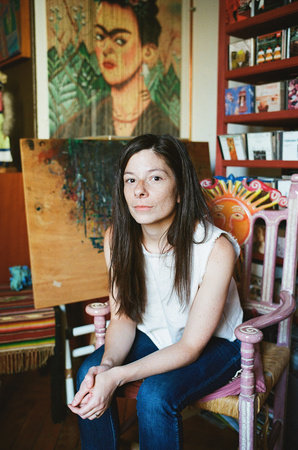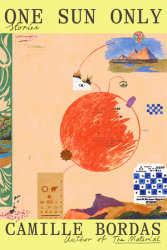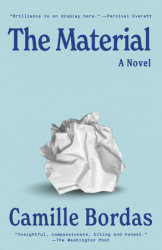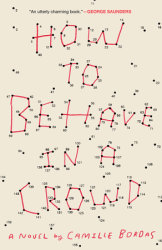Camille Bordas is the author of the witty novel How to Behave in a Crowd, which perfectly captures a family in distress, struggling to cope with a tragedy that strikes down each character with grief. The story unfolds through the keen eyes of eleven-year-old Isidore – a boy who doesn’t quite fit in and lacks a filter, but knows more than others recognize. Readers grasp the true meaning of change with each turn of the page as they watch the Mazal family evolve, and find that growing older doesn’t always mean growing wiser.
We got the chance to talk with Camille about the characters in her novel, creating a unique family dynamic, writing about grief, her definition of success, and more. Read on to see what Camille had to say, and be sure to pick up a copy of How to Behave in a Crowd – you won’t regret it.
PENGUIN RANDOM HOUSE: What inspired your quirky characters and the Mazal family dynamic? And how did you come up with their names?
CAMILLE BORDAS: It’s hard to remember how they all came about. The plan wasn’t always to write about such a big family, but then I kept adding siblings as I went. From the beginning, I knew I wanted to write about book-smart and emotionally inept characters that a more down-to-earth narrator would try to make sense of. Maybe what brought it all on was a memory of my mother going back to university to get a PhD when I was eight or so. I remember her office in our house being off limits when she worked, every night coming back from her day job, smoking her pipe. The word “dissertation” came into my life very early on, and I didn’t quite understand it, but it seemed really, really important. I wanted to explore, go back to this feeling from childhood of having absolutely no idea what the people I shared a house with were up to.
I discovered the family dynamic as I wrote the story. The characters determined it little by little. I realized as I went that the whole family was this sort of emotional Ponzi scheme in which everyone thinks the others are doing great and continues with business as usual, until Isidore understands everyone is just pretending they know what they’re doing and the whole structure collapses.
And coming up with names is like everything else when I write: I “just” have to find one point of entry, and things will sprout from there or arrange themselves around it as I go (veeeery slowly). The point of entry here was Isidore’s name. I wrote a chapter of this book in French before I decided to switch to English, and Isidore’s name was Isidore’s name only because he had to have the stupid nickname of “Zizi,” which became “Dory” in English. Once I had “Isidore,” whenever I added a sibling, I just had to find a name that went well with it, that had the same kind of cultural weight (Isidore is a very literary name, that of Isidore Ducasse, better known as Lautreamont), so that’s how Simone’s, Leonard’s, and Berenice’s names came about. Jeremie and Aurore just made sense with the other names, I thought. It’s all mostly instinctive.
PRH:How were you able to so successfully capture the essence of an eleven-year-old boy coming-of-age?
CB: By writing the book! And by staying close to Dory’s worries and obsessions and how he voices them. No character has ever come out of my imagination fully formed: It is as I put them in different situations and let them figure things out that I get to know them, and more importantly, get a sense of how they speak. The questions, as I wrote Isidore, were not so much “What is it like to be an eleven-year-old boy?” but more “Would he say this or that?”
Also, there’s obviously no one way to come of age – whatever that may mean – so I was never there asking myself, “Does that fit the bill of a male coming-of-age story?” One thing I remember from my own time as an eleven-year-old was that I never gave my being a girl too much thought. I was more concerned with what it meant to be alive than what it meant to be a girl, so I have no problem writing from a boy perspective. I remember being eleven, twelve, thirteen years old very vividly. The sense memories of it are particularly strong: a constant discomfort, a feeling that things are going too slow, the impossibility of knowing if you’re the first person to think a thing or if it’s part of the process for all of us, the impossibility of knowing if everyone else is having a super weird time too. I think they’re pretty universal questions one asks oneself growing up. I just tried to find a character who would voice them in a unique way.
PRH: Why did you choose to tell this story from Dory’s point of view? If you were to rewrite the story from another perspective, which character would you pick as the protagonist?
CB: Obviously it wouldn’t be this story anymore if I wrote it from another point of view, but there was a moment when I thought about maybe writing a whole story (or even a short novel) from the point of view of Dory’s mother, and not about her whole life but about the few hours before she has to tell her children about the death of their father. I was quite interested in that – that moment, and that particular character in that moment. Maybe I’ll end up doing it. We know very little about the mother’s character in the end, but I have a feeling she might be a pretty interesting person to write in the voice of.
PRH: Dory differs from his older siblings in that he places trust in those around him. Do you think that losing this sense of trust is just part of growing up? Is trust synonymous with innocence – with being young?
CB: Unfortunately, I sort of do, and that’s why I love writing young characters; they’re not corrupted by experience, they can go into things open-heartedly without it meaning that they’re wide-eyed or incurably naive, so that makes for more narrative possibilities – and more potential for heartbreak, also.
SIG: Is it necessary to incorporate humor into dark novels? Is a balance important?
CB: I think it is necessary to incorporate humor in all novels. Period. But that’s just my opinion. It doesn’t mean everything should be puns and jokes and slapstick, but it’s rare that I like entirely humorless books. One touch of lightness in 500 pages of horror can be enough. Humor is just a form of distance you put between yourself and a situation, and yes, I do think that in facing a horrible situation, it is essential to know that among all the coping mechanisms – or whatever you want to call them – humor is an available option. In art, I think you don’t get to move people if you don’t have that distance on horrible things. If you only line up horrifying stories without any humor whatsoever, the reader will be nothing but horrified – and if that’s your goal as a writer, that’s great of course, it just doesn’t happen to be mine. Also, though, I don’t want to mislead anyone: How to Behave in a Crowd is not a comedy, it just has these lighter moments, the humor in it is sometimes just there to hide some deep sadness. There’s this quote I heard a lot in France when I was a kid, I don’t know if you have it in America: “Humor is the politeness of despair.” As a child, I didn’t understand what it meant, I didn’t understand the grammar of it, how despair could be polite, etc., but anyway, it ended up making a lot of sense when I grew up.
SIG: What is your strategy for writing about grief? Do you tap into your own?
CB: No. For some reason, I don’t like doing that. Although, it did happen in the past that I wrote diary-type things (I could never keep a journal for more than five days, even as a very sad/annoying/misunderstood teenager), long paragraphs of feeling sorry for myself, and suddenly one sentence would come out of it and make sense or seem useful beyond my personal experience, so I’d decide to keep it for fiction. But that seriously happened maybe three times.
SIG: How do we cope with loss differently as we age?
CB: I don’t think it’s an age question as much as an experience question, or a combination of the two, or how comfortable you happen to be in your life at the moment you lose someone. I’m not a loss specialist or anything, but I’ve lost people I loved at different ages, and it certainly doesn’t get easier to deal with as I grow older, but I noticed one thing is that I now deal with loss more and more privately. Maybe if you lose someone you loved early on in life, as a teenager, say, there’s this idea or sense that you have to display your grief or something, like Isidore: He feels he has to cry a certain amount after his father dies, otherwise it will mean that he didn’t truly love him. Well as I age I kind of realize that I don’t get anything out of displaying my feelings when it comes to it, because there’s nothing less shareable and more personal than losing someone. By personal, I mean lonely. It’s the epitome of solitude, you’re left alone with memories of a person that absolutely no one else has.
SIG: Would you label the Mazal family as dysfunctional?
CB: No. I don’t really know what that means I guess. They do function. As I said earlier, describing their dynamic as this emotional Ponzi scheme (and now saying the words again, I’m thinking it might actually be more of an emotional Jenga), they rely on each other, they take each other’s pulse regularly. Even if they don’t interpet each other’s “symptoms” very well, there’s still a lot of love underneath it all.
SIG: Which is more valuable: academic excellence or social intelligence?
CB: Depends on how many friends you want to have! Seriously though, it fortunately doesn’t have to be one or the other, I don’t think. Academics have always sort of fascinated me. What I like about them is how relentless they are at work. I had this professor in grad school who told our class one day: “Why are we all here?” His answer: “Because we never want to work.” And I found it funny of course, because it came from a brilliant man who’d published many books, some of them the size of small ocean liners, someone for whom his work was so obviously at the center of everything that he couldn’t tell the difference anymore between doing it and not working. He had spent half his life working as an anthropologist in Oceania, but he would always tell us that you didn’t need to go to the other end of the world to study humans, that any condo association meeting would do. To him, there was always potential to study, and I liked that idea a lot.
PRH: How do you measure success?
CB: Well, it’s probably one of those things everyone uses different tools to measure and the results don’t end up meaning anything. Like happiness. There was this study about what country was the happiest a few years ago, and I think France fared quite poorly, worse or just a little better than Afghanistan. That, to me, means that French people have impossible standards. I mean, France has many problems, but it also has a lot going for it. It’s a pretty nice place I think, as far as countries go. I find life easier there than in the U.S. – it’s a country still mostly meant for people. We sure like to complain though. I joke about this a lot. Once, on the phone with my mother, after she asked how I was doing, I told her: “Well, apart from my marriage, my health, and my career, nothing is well.” Also, success is fleeting, and luck has a lot to do with it, so it seems a little arbitrary to stop and try to measure it at any given time. I never pause and reflect on how good I’m doing. I’m sure it would only make me want something more. You always want something more, be it money, the loss of five pounds, or whatever. Right now I’m doing well, but the thing I know I’ve often wanted more of is drive. Succeeding for me as a writer would be to write something I’m happy with and still want to write something else after that. To not be in constant fear that I’ll never write again. To know that I’ll always want to do it. And that’s an impossible thing to know.
PRH:What’s one thing you would like readers to take away from this story?
CB: A good memory of having read it. Ideally, they will remember moments from it, will want to pick it up again later, down the line, read it again, differently. As a reader, I never expect to learn lessons from a novel. I don’t think the novels I love most try to teach me anything. Stanley Elkin wrote: “For conveying ideas, novels are among the least functional and most decorative of the blunt instruments,” and as far as I’m concerned, he’s entirely right. All I want from a novel is time out from the world. I hope mine can give that to someone.














